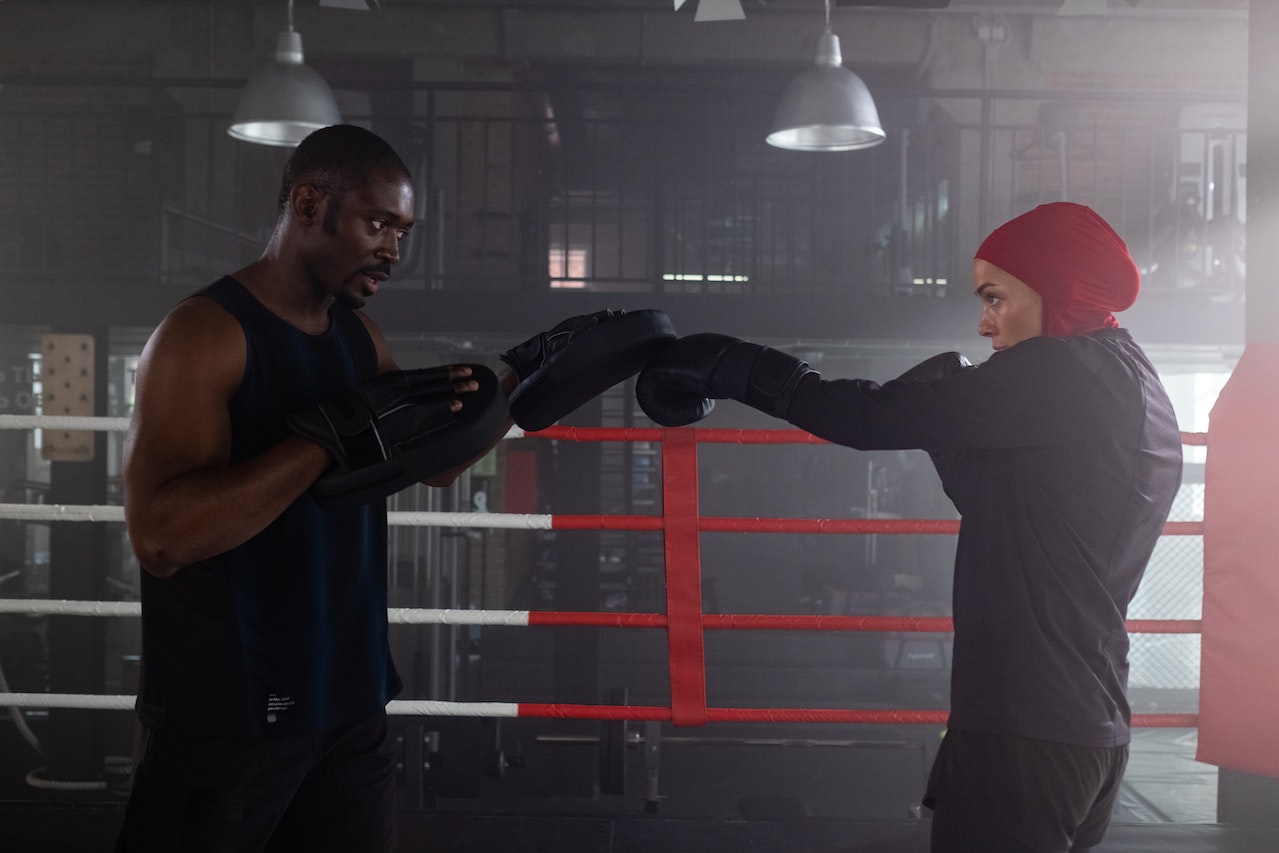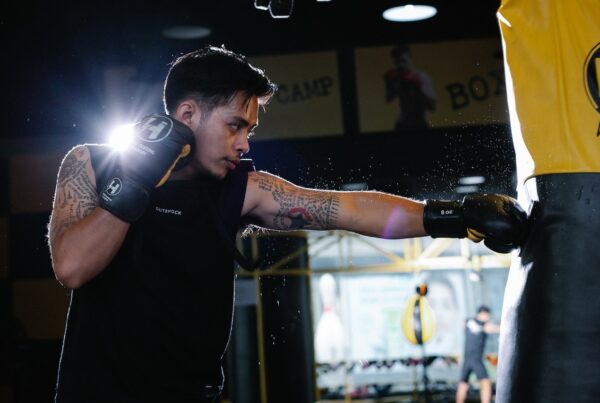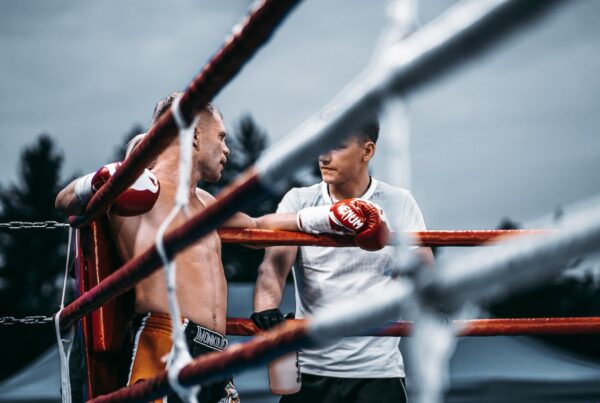Table of Contents
Why Do Boxers Bend Down (Hunched)?
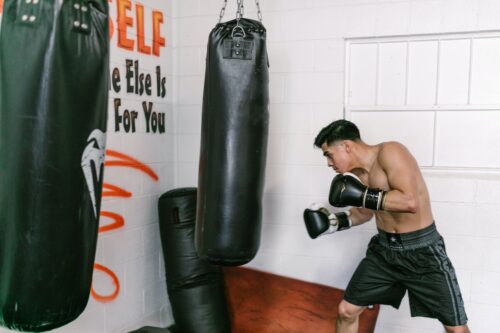
Boxers bend down to keep their balance
Boxers bend down (hunched) to ensure that they have the best balance – to avoid being pushed down by an attack.
Leaning backward or standing straight up would make it much too easy for an opponent to rush you and make any potential defense easy to get past. Being bent down and hunched over (but not so much that their balance is compromised) will make it easier to move quickly when needed.
Additionally, when you are in a hunched position with your knees bent, you can add additional power to your punches while having the best possible posture.
Structure and posture are crucial in any martial art or combat sport. As someone who has studied combat sports for years, I can confirm that this is advice that anyone who instructs any form of martial arts will tell you that it is essential to have your balance and footwork be as solid as possible.
If your footwork and balance are more solid than your opponent’s, you will be able to move faster, have a stronger defense, and land your punches with more power than your opponent.
In this article, we will go over 5 tips to enhance a strong boxing stance. We will go over several frequently asked questions regarding the ideal boxing posture as well. Adhering to these tips and the FAQs will enable you to better protect yourself in the ring with improved posture (making you harder to hit), move faster, and add more power to your punches.
The five tips for a more effective boxing stance are as follows:
- Stand with your feet shoulder-width apart, hip-width apart and your weight evenly distributed between both feet.
- Bend your knees and keep your back straight.
- Keep your head up and avoid leaning forward or backward excessively. 4. Keep your hands up and avoid holding your opponent’s punches. 5. Use your knees to push off the ground and move in a forward direction to land more punches.
Also Read: How Tight Should Boxing Gloves Fit? Sizing Break-In Guide
Effective Boxing Stance: 5 Tips

Stand with your feet and shoulder properly apart
1. Stand with your feet shoulder-width apart
Standing with your feet shoulder-width apart, hip-width apart, and your weight evenly distributed will allow for you to have the best balance possible. You will also be able to move more quickly to either dodge an attack or launch one once you spot an opening within your opponent’s defense.
It is nearly impossible to move quickly if your feet are not evenly holding your weight and or are spread out wider than your shoulders. Even if you could land a punch with your feet and knees spread out further than shoulder length, it would not land with the
same power as it would have had your feet and knees been properly placed as they should be (no further width than your shoulders).
2. Bend your knees
Your knees should always be slightly bent to ensure you can move with as much speed and power as possible.
Additionally, when your knees are bent, it will help you to push off the ground (canvas) to add additional power to your punches. I will discuss how and why this works in more detail below.
The more locked up and extended your knees are, the harder it will be to move with any speed. It will also drastically reduce the power your punches would have landed with. If you wish to test this, try standing up with your knees fully extended and not bent at all.
Your back should be straight since it helps to have some additional snap to your punches, and with a straight back, you will be able to pull your punches back to a defensive position more quickly, should you need to do so. If your back is not straight and is leaning too far forward or too far back, you are sacrificing your speed, power, and defense, making it easier for your opponent to beat you.
3. Keep your head up
Keeping your head up will make it much less likely to get hit with an uppercut from your opponent. It will also ensure you can better see what your opponent is doing (or trying to do) in the boxing match.
Leaning forward or backward excessively would give your opponent an opening to attack you in a way that you would be more likely to fall over. One solid punch landed from an opponent while leaning forward into it would have a much higher likelihood of knocking you down.
One solid punch from an opponent as you are leaning backward would be more likely to cause you to lose your balance and be knocked down. Additionally, should you have an opportunity to land one, your counter punch would be much weaker and less effective if thrown from someone who was excessively leaning back.
Ideally, one should keep their back straight and not lean too far one way or another to not give your opponent any advantage with their attacks against you.
While your head should always be up, your chin should be down, with your eyes looking straight ahead. This will allow you to better see your opponent while simultaneously protecting your chin and nose as much as possible.
4. Keep your hands up
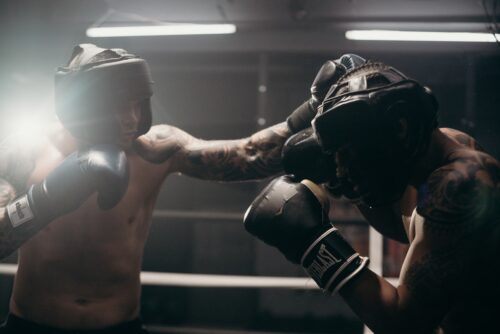
Avoid the opponent’s punches with your hands
It is always essential to keep your hands up, as your opponent will not tell you when a punch is coming and where they will try to hit you.
Remember, the number one rule of boxing should be to always protect yourself. Therefore, your hands should always be up.
While it is ok to catch a punch with your glove (the shot is caught by you tapping it down with your glove, you should not hold onto the glove or any part of the glove itself, as this can get you a warning from the referee, and potentially cause you to lose points in the match.
While holding your opponent’s punches is not acceptable, you can hold them in a hugging motion, which will tie up your opponent’s arms and not allow them to hit you. This can be done to minimize any damage from your opponent’s punches.
5. Use your knees to push off the ground
Using your knees to push off the ground will give you a lot more power when you land a punch on your opponent. This is one of the main reasons it is helpful to keep them slightly bent.
Additionally, you should move forward with your foot and knee closest to your opponent. Moving forward (when you are safe to do so) means your opponent has to move away from you. The more they move away from you, the more you control the ring.
Moving in a forward direction to land more punches will force your opponent to move away from you. The more your opponent moves away, they are (at least temporarily) in defense mode.
The more time your opponent spends being defensive than offensive, the safer you will be. You will probably be able to land more punches on your opponent this way as well. Moving forward does not necessarily mean going at someone straight ahead into their punches. You can also move forward at an angle if you have just dodged a punch.
In the picture below, you will notice that the boxer with the white trunks is moving forward toward his opponent at an angle instead of attacking straight ahead. This attack is first set up by placing your forward foot and knee (which is the left for the boxer in the white trunks) to the outside of your opponent’s leg, then attacking forward.

While the boxer in white is moving forward, he is also doing so at an angle that is as safe as possible for him (not so much for his opponent). This could have been done on the opposite side as well.
Also, if you look closely, you will notice that the boxer in the white trunks has his head no closer to his opponent than his knee is (please see Effective Boxing Stance tip number 3, where it is suggested you do not lean forward or backward excessively.
You may have also noticed that since the boxer in the black is leaning back excessively in this picture, he is more vulnerable to other attacks from his opponent.
While boxing is a physical sport, it is also a very physical chess match. By moving forward, you can get an advantage over your opponent by forcing them to fight off the ropes or from within a corner where they will have less space to move in.
The less they can move, the fewer of your punches they can avoid. This will give you an advantage in your boxing match against your opponent. The following questions are frequently asked questions regarding obtaining a strong posture for boxing. Having a solid posture when boxing is crucial for defense and for, speed and power.
Also Read: Boxing Hardest Punch! The Top 5 You Need To Master To Hit Hard
Boxing Posture FAQs
Q: Should You Lean Forward While Boxing?
No, you should not lean forward in boxing. Leaning forward while boxing makes it more likely that your opponent will be more able to easily hit you. If you lean too far into a punch, you are essentially making your head a bigger target for your opponent as you are bringing it closer to them.
Also, where your head goes, your body follows. If your head moves too much, you are telling your opponent where you are moving next, making it much easier to defeat you.
This is not to say you should keep your head far back, either. Instead, your head should not go any closer to your opponent than your closest knee to your opponent when you are throwing a punch. This will keep your balance strong and allow you to
strike with the most power possible. Please look at the picture included in this article under tip number 5.
Q: Should You Bend Your Knees in Boxing?
Absolutely yes, you should bend your knees in boxing. Doing so will ensure you can move more quickly while punching or dodging punches.
Boxing with bent knees will also ensure that you can gain more power with your punches when pushing off of the canvas upon making an impact against your opponent. The more your knees are straight or locked out, the more slowly you can move. The slower you move, the more punches you will be unable to avoid.
Q: Should Your Heels Touch the Ground When Boxing?
Definitely not. When your heels touch the ground, you are flat-footed. If you are flat-footed, you are going to move slowly and awkwardly. Slow movement puts you at a considerable disadvantage when facing your opponent.
When you balance on the balls of your feet with your heels up, you can turn quicker and push off either foot to move in the best direction to either avoid a hit or attack your opponent. This of course, helps to gain a tactical advantage over your opponent.
Q: Should You Lean Into Your Punches?
Again, definitely not. Just because a punch is thrown does not mean it will land on your opponent. Leaning into it will throw you off balance, making a counter shot much more likely to knock you over.
Additionally, leaning into it can diminish your power as well. Not to mention that if your head is leaning too far forward when you are punching at your opponent, you are essentially making your head an easier target for your opponent to hit.
Instead, when punching your opponent, your head should go no closer to your opponent than your knee closest to your opponent. This will ensure that you are not leaning too far forward when landing your punch and that you can still move as quickly as possible. You will be able to punch with more power this way as well.
Q: Does Boxing Ruin Your Posture?
On the contrary, posture is improved by boxing. Exercises in training for boxing strengthen the back and shoulders.
The strong your shoulders and back are, the better you will be able to handle regular tasks overall. A stronger back and more muscular shoulders will automatically improve your posture.
Stay Hunched Down: My recommendation.
In conclusion, if you are interested in boxing, it is highly recommended to stay hunched down and follow the five tips to improve your posture as well.
This will help improve your speed, defense, and power. While boxing is a very physically demanding sport, it is also a physical hands-on chess match.
The number one rule in boxing is to always protect yourself. Once you have trained to consistently to improve your structure using these tips and abiding by the answers to the frequently asked questions, you will make yourself safer in the ring, have better balance than your opponent, and be able to strike with more power and speed than your opponent as well.



